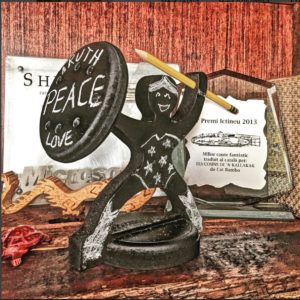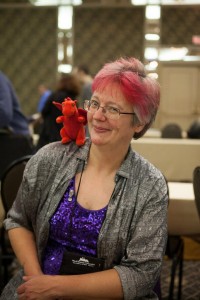
In part one of this series, I talked about the Science Fiction & Fantasy Writes of America (SFWA) prior to the move to bring in the independent writers. This section will discuss the decision and the process, as well as some of the reactions. My sources in putting all of this together are my own faulty memory, my personal notes, and the Internet. The discussion of the indie admission took place in a number of venues, including e-mails, blog articles and comments, social media, and the SFWA discussion forums. In drawing on the latter, I have tried to ensure that I did not violate their confidentiality rules, quoting only with permission.
Nomenclature has varied, but when I refer to independently published writers, that is the same group that others have used self-published, self-pubbed, indie, and other terms to describe. Self-publishing has been conflated with vanity publishing in the past; I believe them two distinct things.
Beginning to Recognize Independently Published Works
As far as I can tell, the question of whether people should be able to qualify for membership with independently published sales was first brought to the board by Vice President Mary Robinette Kowal in 2009. Discussion focused on a couple of points: how to translate the SFWA requirements for professional writers into ones using self-published material and whether or not the gatekeeping done by traditional publishing represented a quality bar. I’m framing that last badly, primarily because I don’t agree with it, but I can understand why, depending on their relationship with traditional publishing, someone might be invested in that view. That discussion moved on, but the question of indies had been raised and would continue to be something discussed at board and business meetings, with increasing support for allowing indies in on the part of some Board members.
...
 One of the very last goals for this month that hasn’t been crossed off the whiteboard yet is “rework Patreon campaign.” It’s a project I’ve been circling for a while, because I’m aware that if I don’t plan carefully, I am quite capable of both overextending myself and making promises I can’t deliver on. I thought I’d show the thought process as I worked through and rearranged, the rationale behind the changes, and some of what I’ve learned from working with Patreon so far.
One of the very last goals for this month that hasn’t been crossed off the whiteboard yet is “rework Patreon campaign.” It’s a project I’ve been circling for a while, because I’m aware that if I don’t plan carefully, I am quite capable of both overextending myself and making promises I can’t deliver on. I thought I’d show the thought process as I worked through and rearranged, the rationale behind the changes, and some of what I’ve learned from working with Patreon so far.
I started the campaign two years ago because I wanted a place to push some of the stories I was writing. In that regard, it’s been reasonably successful, and looking back, I’ve published two dozen stories that way, ranging in length from flash to novelette. Some have been publicly available, like Aardvark Says Moo, Seven Clockwork Angels, and Web of Blood and Iron, while others were limited to Patreon patrons only.
One of the interesting wrinkles that has developed is the question of stories posted only for patrons. Some magazines regard them as already published; some don’t. To my mind, the smallness of the audience makes that a no, but I clearly have a horse in that race.
I speak there not just as a writer but as SFWA President. Being able to sell that story twice nudges the finances up to the point where making a living off stories might actually be viable, depending on the cost-of-living of wherever the writer resides. And it was possible to make a living off short stories, back in the 20th century, but magazine pay rates have not kept pace with inflation, to the point where (imo) it is no longer a viable option unless you’re willing to live very stringently indeed.
Looking back over the past century, that seems indicative of a trend where increasingly money has been shifted away from the creators and moved to the businesses based on the content they create. For example, at the pay rate of .01 per word that Weird Tales had in 1926; in 2017 that’s 13 cents worth of buying power. The SFWA pro rate started at 3 cents a word; if the rate from the 60s had kept up with inflation, the current pro rate would be 25 cents a word, but it’s currently six cents — and that high only because recently the board has pushed to raise it. (My math is based on this inflation calculator, which seems to back up other calculations I’ve looked at.)
...

Yep, I’m running for President, even though that’s a two year term. I’ve got a number of projects I want to see through, and this seems the best way to do it. The self-pub and small press qualifications amendment has passed, and I’d like to help SFWA adjust to that large change.
You’ve seen me in action as vice president for a year. I don’t know that it was the most representative year since I spent most of it on the road, but I think I’ve demonstrated that even when other stuff crops up, I do stick around. I had to put a couple of projects on the back burner while waiting for the selfpub/small press qualifiying vote to shake out but now that the vote has passed, I hope to pick up those loose ends. By now, I’m starting to get more of a handle for the internal workings of SFWA, and that should help me be even more effective.
I’ve fixed a few small problems, and I’ve got some other stuff in motion that will solve others. Some of that is fairly visible, such as the push to make it easier for volunteers to find roles within SFWA. Overall SFWA is still suffering some growing pains, and I’ve found my experience as management very helpful there.
Most of you that have worked with me know that I’ve got decent people skills and a solid work ethic. When it comes to the various factions that clash occasionally, I’ve got friends on most sides and pride myself on trying to listen and understand where people are coming from. I’ve tried to be good about touching base with other members of the SFWA team and working well with them, including weekly Google Hangout sessions and phone calls. I don’t mind admitting when I’m wrong, and I try to learn from both my mistakes and what other people pass along. Aside from deciding to run, I am reasonably sane.
...
Want access to a lively community of writers and readers, free writing classes, co-working sessions, special speakers, weekly writing games, random pictures and MORE for as little as $2? Check out Cat’s Patreon campaign.

"(On the writing F&SF workshop) Wanted to crow and say thanks: the first story I wrote after taking your class was my very first sale. Coincidence? nah….thanks so much."

In this Medium article, Cat Rambo talks about how she tries to control her year in order to hit her writing goals.


This site is protected by reCAPTCHA and the Google Privacy Policy and Terms of Service apply. This site is a participant in the Amazon Services LLC Associates Program, an affiliate advertising program designed to provide a means for sites to earn advertising fees by advertising and linking to Amazon.com.